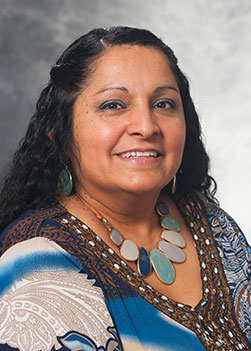
Dr Patricia Téllez-Girón
Dane County has the strongest vaccination rate in Wisconsin for the Latinx community, and a UW Department of Family Medicine and Community Health physician had a big hand in that effort.
By day, Dr. Patricia Téllez-Girón takes care of her patients in the Madison area at the Wingra Family Medical Center, whether it’s a young girl with a respiratory virus, or a middle-aged man injured on the job. But, in her “spare time” she helped lead the charge for vaccinating her community against the SARS-CoV-2 virus, as the co-chair of the Latino Health Council.
About 56% of Dane County’s Latinx population has received at least one dose of the COVID-19 vaccine, the highest percentage in the state. Statewide, only about 37% of the Latinx population has received a dose, and nationwide the rate is similar at 39%.
“There is no way one person can take credit for the success we’ve had in the county,” Téllez-Girón said. “I am so grateful for the collaboration with several wonderful community partners.”
Though she spearheaded the effort through the Latino Health Council, groups including Centro Hispano, Latino Academy for Workforce Development, Latino Chamber of Commerce, Latino Children & Families Council, UNIDOS and Public Health Madison & Dane County actively partnered to bring vaccine education to the community and create access to vaccines.
The key to this high vaccination rate has been the collaboration among these community organizations; using the same messengers, messages and points of access for vaccines.
“My favorite part of Dr. Téllez-Girón is watching her in action – whether it is at a pop-up COVID clinic at Centro Hispano or doing an online forum with community partners, she brings her full self to the conversation, speaks candidly and truthfully with such cultural congruency that you can’t help but connect with the message,” said Karen Menéndez Coller, executive director of Centro Hispano of Dane County. “Partnering with her and the Latino Health Council has been critical to the high vaccination rates for our Latinx community.”
Téllez-Girón aligned this group to spread the word about vaccinations in the community, at the grassroots level, on social media and over the airwaves.
Another key reason for this success has been the work of the UW Health Diversity & Interpreter Services Department, which has helped people referred by partner organizations to schedule their vaccine appointments at the trusted and accessible Wingra Family Medical Center vaccine clinic.
“It was a tremendous amount of work, but in reality, nothing compared to the suffering caused by this terrible virus,” Téllez-Girón said. “Thank you to all the partners who helped spread the word and the community for showing up for one another.”
Published: July 2021
